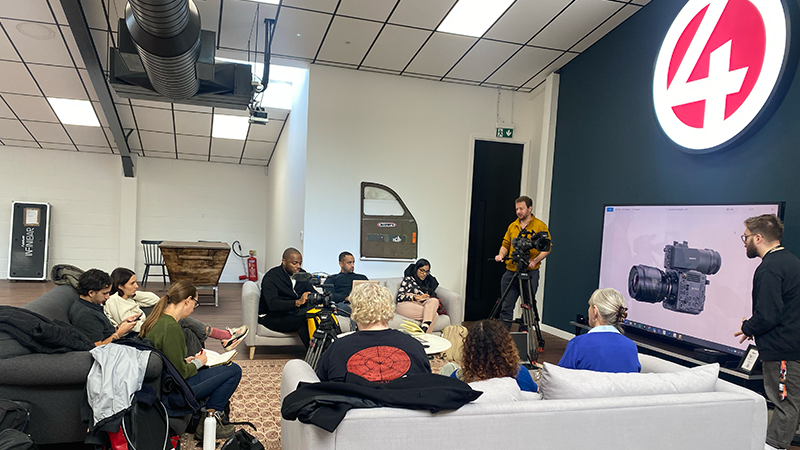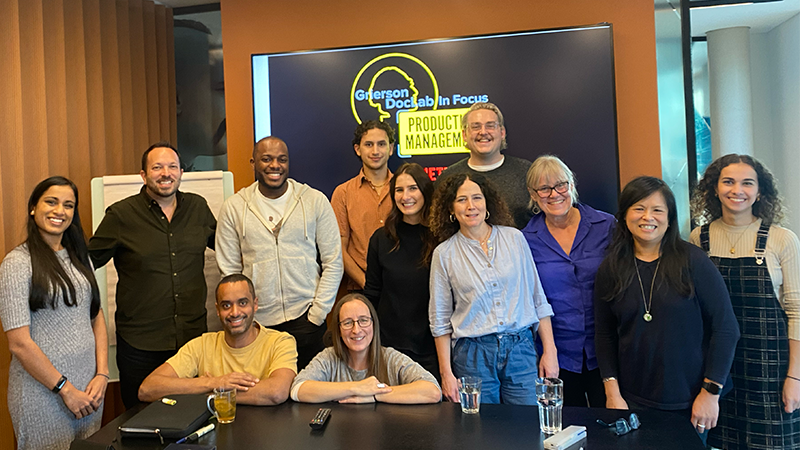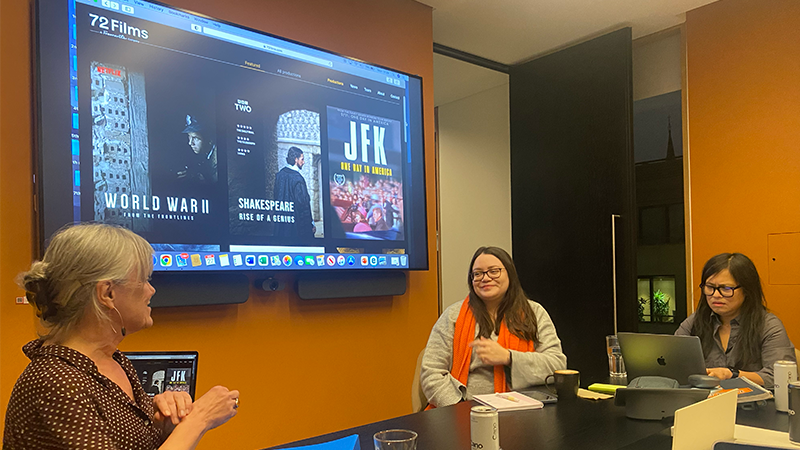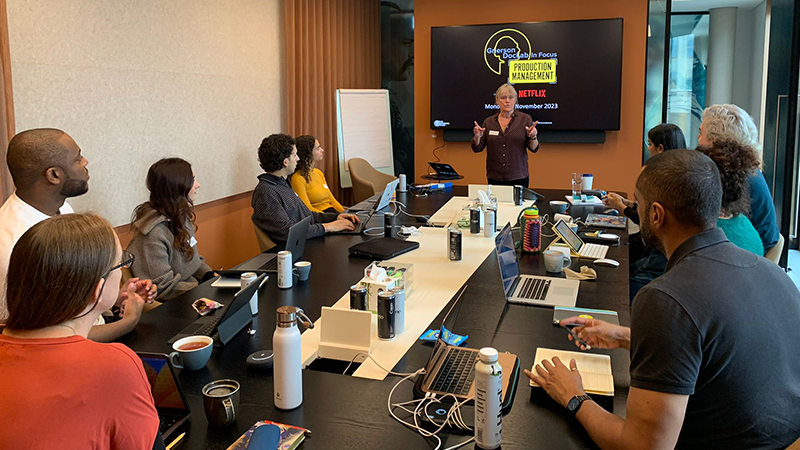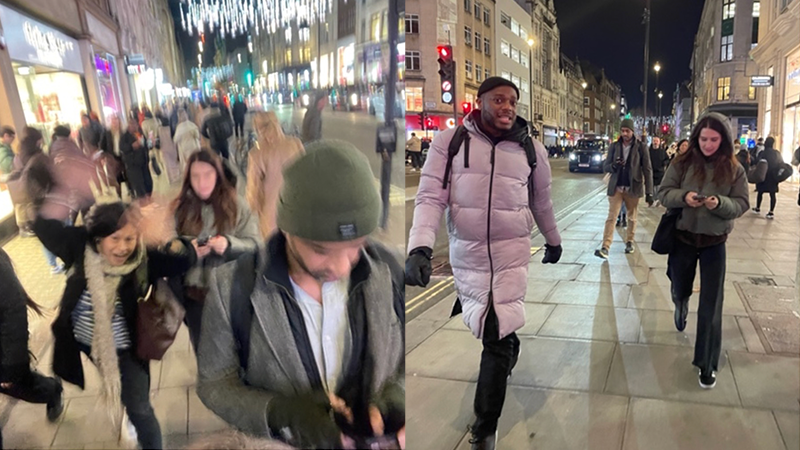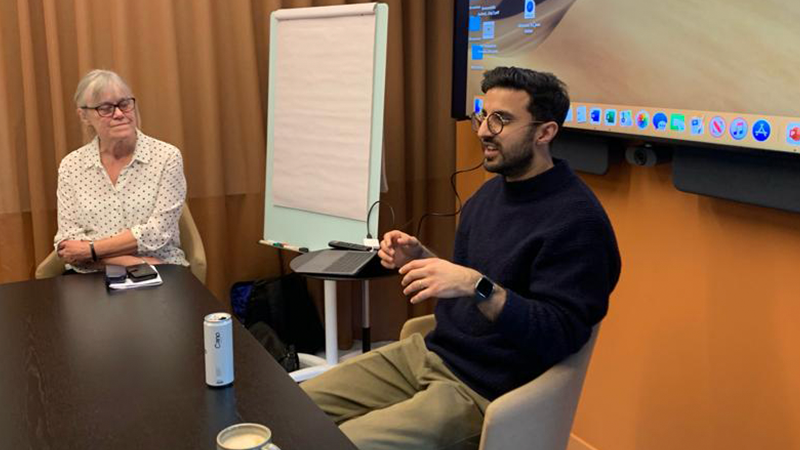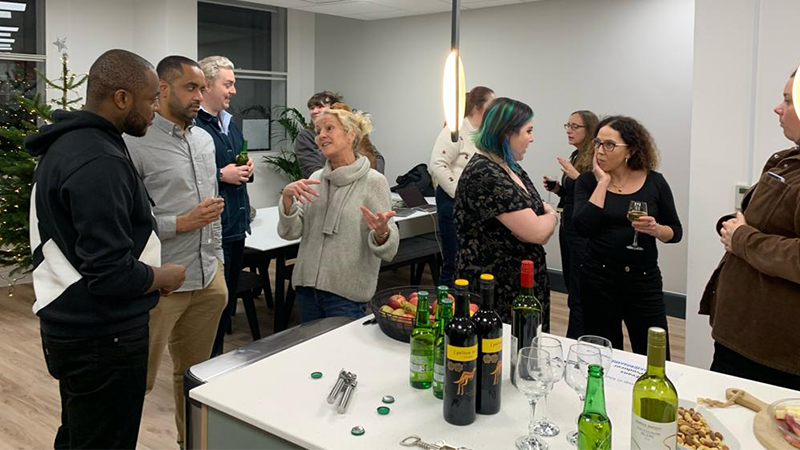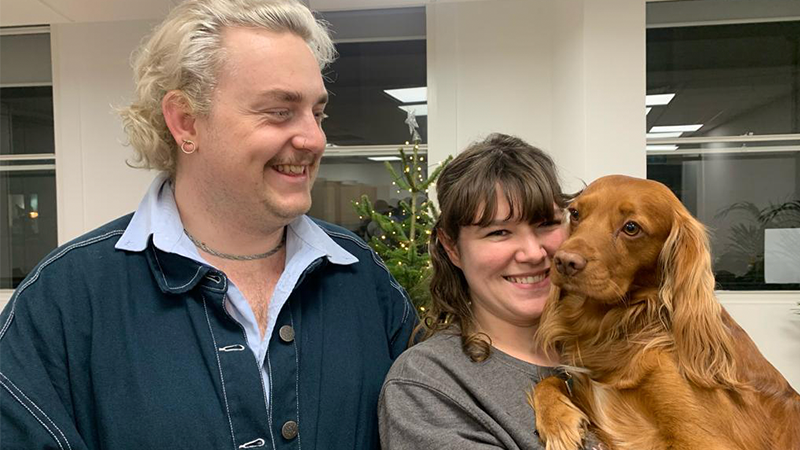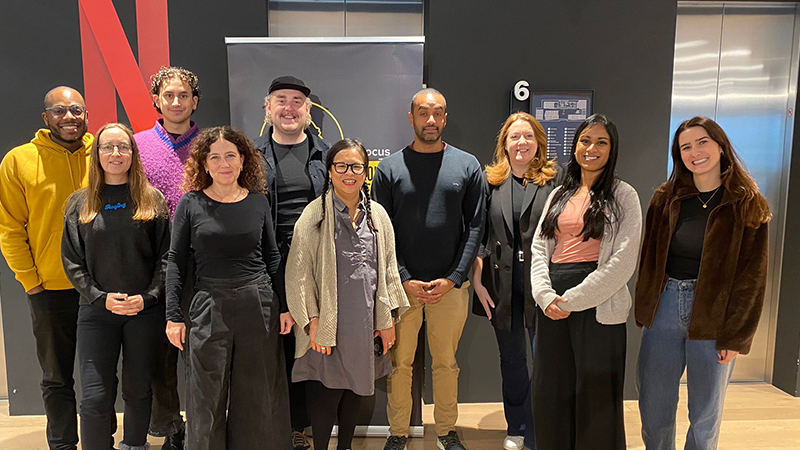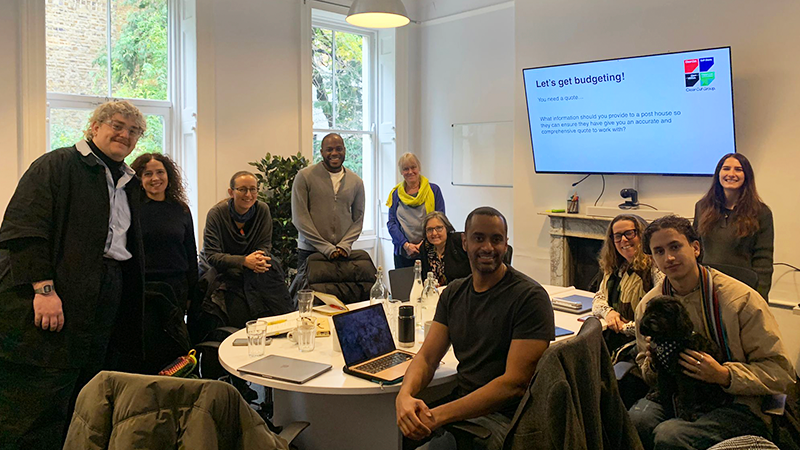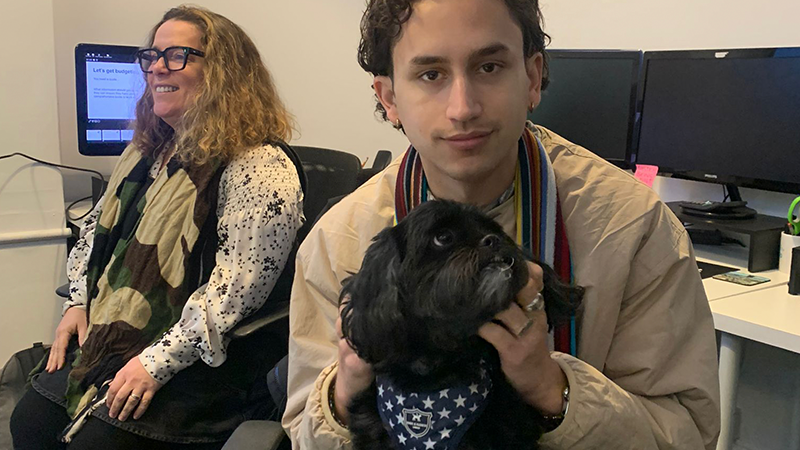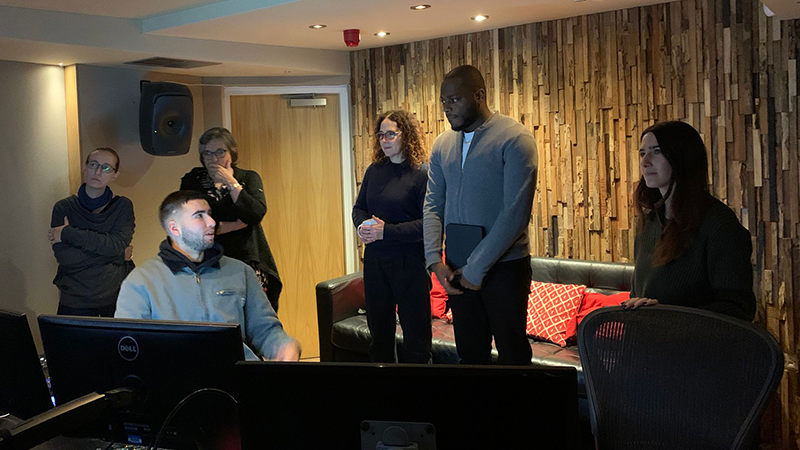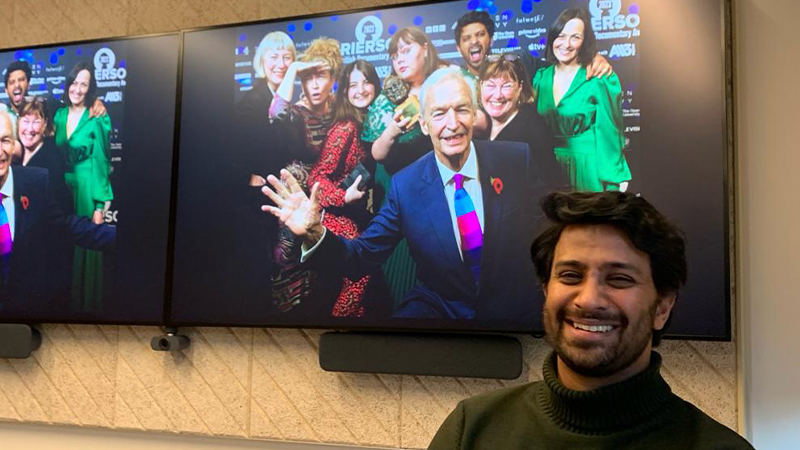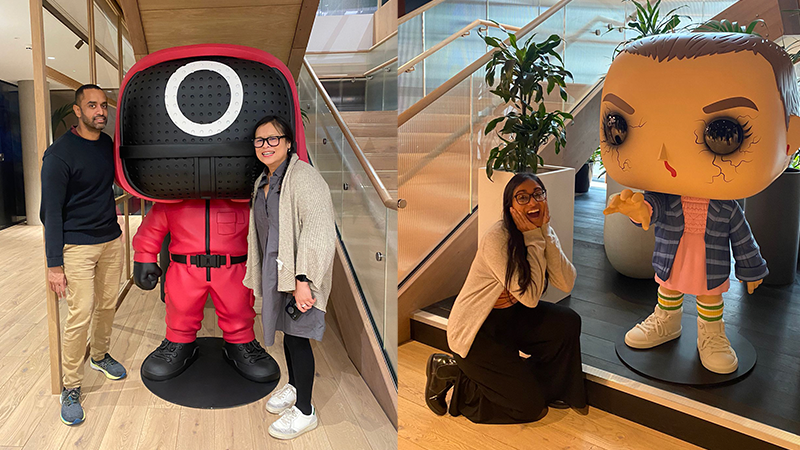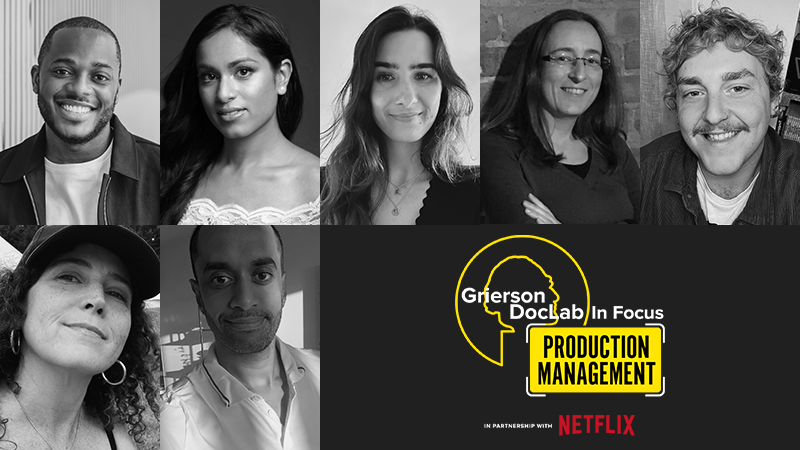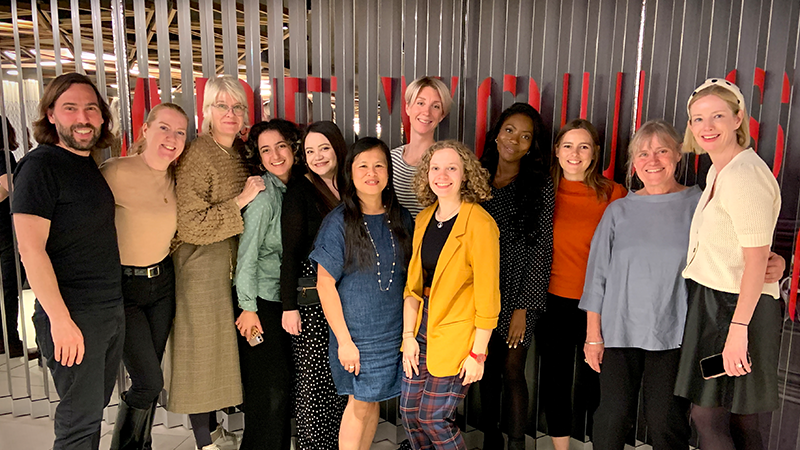January 05, 2024
Hear all about the 2023 Production Management group's training
The eight Production Management trainees set out to the Netflix offices in London in November for a week of intensive training. Read all about what the training covered, their most valued advice and more...
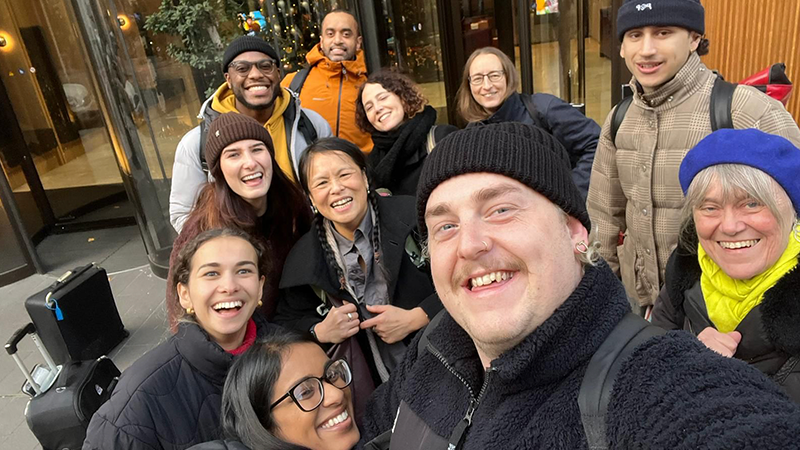
The 2023 Grierson DocLab In Focus: Production Management trainees, Grierson staff and lead trainer, Birte Pedersen.
Monday – Christine Janumala
After weeks of anticipation and exciting documentary viewing, the Grierson DocLab In Focus: Production Management training kicked off at the Netflix offices in Soho! Downstairs, we gathered in the lobby matching Zoom thumbnails to faces. Later, Netflix dazzled with their generous hosting (as well as extensive snack options).
As we introduced ourselves, it was clear we were a diverse group with a shared passion for documentary production management. Many of us studied psychology, previously worked in tech or theatre, or were returning to TV after time away.
While we had fascinating guest speakers the whole week, we were accompanied throughout by Yen’s indefatigable energy, Tanya’s meticulous coordination, and Birte’s invaluable wisdom. With experience from theatre to being the Head of Production at Windfall Films, Birte was an unparalleled guide through the documentary world.
Birte began by outlining the differences in the editorial and production pathways. Learning about these roles, it became clear we were extremely lucky to be able to speak to people at all different stages of these paths. We also delved into the documentary production process, from ideation to final delivery, disentangling treatments, commissioning, preproduction, filming, editing, delivery, and paper delivery.
Documentary journalist, programmer, and lecturer Carol Nahra joined us, offering a historical perspective on documentary making. She described the different approaches in US and UK broadcasting and explored how the legacies of John Grierson and John Reith shaped the industry. The Reithian Legacy's threefold focus to inform, educate, and entertain still rings true to so much of the UK documentary landscape.
The day concluded with a full-circle moment, with Grierson alum Heidi Carmichael, from the 2022 cohort joining us. She shared her trajectory from a background in theatre, a detour into a dental practice, and experiences in short filmmaking and stand-up comedy, reflecting the diversity embraced by the documentary world. As the first day drew to a close over a lively dinner, we were left with a deluge of knowledge, a cohort of diverse perspectives, and the anticipation of the days to come.
Tuesday – Connor O’Brien
On the second day of my training, I took a moment to appreciate the experience and feel grateful for the insight I was given into an industry I have always wanted to explore. My intention for the day was to be present and absorb all the information and experiences I would get.
Birte started the day by introducing planning schedules. We participated in a series of independent and teamwork exercises to learn about the process of planning the diary of a one-episode 60-minute unscripted programme. I worked with Clíona to think about all logistical planning within this production while working within the allotted schedule. Although logistical planning might not seem very exciting, I found it satisfying to exercise this part of my brain!
We then gained insight into call sheets, working budgets and cost manager schedules, specifically the important 31 and 32. I enjoyed delving into the more technical areas of the production manager role and found the training to be engaging and informative, allowing me to understand time management and budgeting in production.
Before our lunch break, Birte shared a valuable piece of wisdom – saying “Let me get back to you on that” instead of "No.” I believe this is a universally valuable piece of advice that I will undoubtedly use liberally in the future, regardless of where I end up.
During our lunch break, Jonathan Mussman, VP of Production at Netflix, came to introduce himself and get to know us. One takeaway from this meeting was Jonathan telling us that “Production managers are the true creatives with all of the power.” It was an incredible honour to have Jonathan visit us and generously give us his time.
Jane Zurakowski from BBC Studios also gave us a wonderful aerial view of the world that is BBC Studios. Jane covered the key skills of a great production manager. I appreciated her conversational and holistic approach during her talk. She was approachable and warm, as well as eager to share her insights into the production manager's role and the industry beyond it.
We also met Melissa Hameed from The Garden to talk about all things fixed rig! It was fascinating to delve into the inner logistics of shows like 24 Hours in A&E and gain insight into the specifics of planning a monumental production with many moving parts. I could have listened to Melissa for much longer and found hearing about her experience working for The Garden incredibly fascinating.
To end the day, we took a group trip to the London Migration Film Festival at Curzon Bloomsbury to watch the touching documentary In the Rear View directed by Maciek Hamela. The documentary followed the experiences and told the stories of the evacuees in the setting of the backseat of Hamela’s vehicle, as he underwent evacuation efforts driving people out of Ukraine following the Russian invasion. It was a heart-rendering story of how war affects individuals personally.
Today was fully jam-packed with incredible knowledge and experiences. I am starting to really believe that being a production manager is something I would thrive in. My existing attributes mixed with a great work ethic and a can-do attitude seem to be the recipe for success, all thanks to the help of the Grierson Trust!
Thank you to everyone who had a part in delivering such precious knowledge and support. I feel fortunate to have been given this opportunity to develop and grow within the docs and unscripted world.
Production Management training week 2023
Wednesday – Prad Ray
Our third day of training kicked off at Shift4, a key supplier of production equipment.
Paul Kendler and Jordan Hughes were our trainers for the morning. Paul has 10 years’ experience as a Technical Manager and has also worked alongside production co-ordinators in studio environments as a runner and data wrangler. Jordan sits within Shift4’s Accounts Management team and has accrued three years’ camera operation/Junior DP experience as well as having a 1st class degree in Television. We were obviously in very safe and knowledgeable hands.
We were introduced to the two most popular cameras in TV documentary making today, the market-leading Sony FX3 and FX9. As a working example we weighed up the pros and cons of these two pieces of kit. The FX3 is compact and therefore lighter, easier to hold for longer periods and less conspicuous. The FX9 is a full-frame cinema camera, can shoot in 6K (in contrast to the FX3’s 4K) and has more onboard controls, the most important being those related to sound.
Next, we talked about aspect ratios and cropping. Being able to film full frame allows the PD to zoom in and crop, something not possible with the FX3. Your choice of camera will also affect your choice of attachments and accessories, such as sound, lenses, adapters, batteries, memory cards, data and storage.
Paul shared with us exciting developments in the industry - 8K cameras made specifically for broadcast/TV. Japan has already begun filming in 8K, and Sony are launching the Burano in 2024, at a price point accessible to most production studios. The discussion moved on to costs, and it was apparent how quickly these soon add up!
Lastly Paul and Jordan shared best practices related to kit management, logistics, and Carnets, which are particularly important when dealing with customs when shooting abroad.
The 2 key takeaways for me from our morning with Shift4:
- The importance of treating the supplier as a trusted advisor. Suppliers can really help you interrogate the brief and manage the demands imposed on you by the production team, as well as ultimately supporting you in your goal to optimise costs.
- How taxonomy, memory card management and data wrangling are key to ensuring your production is built on solid foundations. Time is money, and if you get these elements right, the benefits will be felt by individuals in each phase of the production process and ultimately in your budget sheet.
Wednesday – Rozi Peters
After our morning on site at Shift4 we spent the afternoon back at the Netflix offices and were lucky enough to be joined by Director of Production, Louise Murray from the multi-award-winning Minnow Films who are known for their ground-breaking documentary and drama productions.
It was a privilege to be able to ask Louise about the logistics behind their productions and in particular SAS Who Dares Wins. She was incredibly generous with her time and knowledge and gave us an invaluable overview of everything there is to know about managing a large overseas unscripted production, covering: contributor welfare, working with location fixers, the importance of maintaining a strong relationship with your insurers the mix of ‘off rig’ and ‘on rig’ footage, how the rigs are set up and operate, how many production coordinators it might take to manage a large show, and what kind of duties each role might be covering.
Louise defined production management as creative problem-solving, she pressed home how important it is to understand and value each crew role on every production and to understand that being a good production coordinator doesn’t necessarily make you a good production manager (and vice versa!) From my seven pages of notes I’ve copied some of her other top tips below:
-
Always remember your role is important whatever level
-
Do every job with enthusiasm
-
Keep a good email trail
-
Always care about detail and ask yourself what you would feel happy with for yourself
-
Keep learning
-
If you’re not sure – ask!
-
Take an interest in the editorial and how your role can support their vision and make sure you understand what you’re making.
For the rest of the day, we had Birte expertly guide us through contributor care, managing complex call sheets for large productions, and simple negotiation skills for communicating with potential contributors or locations. For this last tool, we were split into pairs with one of us representing the production manager or production secretary and the other representing the owner of a location they were looking to use. It was a fascinating exercise and gave real insight into the psychology of negotiation, how to approach these situations, and what it might feel like to be approached. We examined what made the contributor want to support the production and what made them disengage. Birte also brought our attention to what promises we could realistically commit to in the moment and how to respond to demands that are out of our remit while keeping the contributor engaged and keen.
Wednesday was our only evening without an event planned and we were all grateful for the chance to rest, recharge and take stock of such an incredible, full week of amazing training with fantastic speakers and tutors!
Thursday morning – Ozzie Clarke-Binns
Day four began with a visit from Nelesh Dhand, a Trustee of the Grierson Trust and Commissioning Editor at Netflix.
We discovered how the documentary team at Netflix is dedicated to finding stories with a global impact, while also providing a platform for local talent. Their goal is to tell strong, accessible narratives that can find universal appeal.
As Nelesh concluded, we were joined by Polly Allen, Production Executive and Sky McCann, Production Manager both from Lightbox. They shared a wealth of knowledge from their combined experience, but one point in particular stood out to me, which could be beneficial to others on their unscripted journey…
The revelation was that feature documentaries and series have distinct energies. I'd never considered this before, so it was quite an eye-opener. To some, feature documentaries are the epitome of the documentary medium, but like any medium, they have their place in the broader landscape of unscripted storytelling. However, the experience of working on them can be vastly different.
A feature documentary, with one edit and one editor, allows the edit more room to breathe and is more self-contained. It is not necessarily easier, but all the challenges are filtered through a singular output. Thus, features can feel more bespoke and provide a more intimate experience.
In contrast, a series can feel more like a well-oiled machine. With more people, larger budgets, and the relentless momentum of "a train" with multiple deliverables. The scale of production can make it feel more impersonal than a feature. The level of coordination intensifies, especially when teams are shooting and editing simultaneously.
Sky and Polly advised us to work on both formats to figure out which model we prefer. Reflecting on what you enjoy watching might provide some insight. For me, it's features. I adore the singular, contained arc told in one sitting. However, given my years of experience in growing start-ups, I may just find the wild ride of working on a series even more enjoyable.
Industry speakers, Blast! Films offices and more
Thursday – Clíona Ní Mhocháin
Industry insights, cheese, wine and office doggy!
After a fun rummage through online resources in the morning we began to dig into the detail of all things archival with Birte after lunch. Defining what archive is, we discussed the online sources we’d looked at earlier and went through what needs to be cleared before it can be used (basically everything!). As normal our group had questions at every point, prompting lots of discussion and some great real-life examples.
Elizabeth Maj – Post-Production Executive, Netflix
After a quick whip round the room to introduce ourselves, Elizabeth then gave us a rundown of her career – I love hearing people’s journeys into the industry – which for her started with a degree in dance.
Elizabeth gave us a comprehensive guide to how post-production works at Netflix using an actual delivery document for a past show. It had a lot of acronyms and industry terms so we were very happy to hear a copy would be given to us to read again later. The main points were that Netflix are thorough and they have a long list of deliverables which we will have to become accustomed to. I was (maybe overly) enamoured by how systematic and methodical it all was but I have long accepted the organisation-nerd side of myself, and it comes in handy at work!
After a quick break to re-caffeinate and load up on snacks (excellent selection Netflix ) our next speaker was up.
**Kirsty Urquhart-Davis – Senior Line Producer, Nutopia **
Kirsty began by treading the boards, at the Royal Shakespeare Company no less, before changing tack and undertaking some training in television production leading to her first role… Production Secretary!
She described the staff structure at Nutopia on both editorial and production and how it expands as necessary depending on the scale of the productions.
I really enjoyed listening to Kirsty, so much so that I forgot I had to write a blog and didn’t make enough notes, but some key take-aways were:
- Try different genres of television, each will have invaluable learning and it’s the best way to make an informed choice on what you want to focus on.
- Think about the role, not the job title – development and learning opportunities as each project will be different.
- Production Management is creative!
- Note down the production company of every doc you like. Contact them and start those relationships.
- Build relationships with the production team at the Broadcaster – this will create an air of openness that is crucial especially if any financial issues arise.
- Documentaries with reconstruction adds a whole other element – sets, props, costume, wigs, actors, locations…
- Production Services in other countries can often be the best and easiest solution – local knowledge… and tax rebates!
- Look out for free courses via ScreenSkills.
We said our goodbyes to Kirsty and promised to keep in touch then quickly packed up and, after staging the pilot episode of Race Across London (Rush Hour), we arrived at the offices of Blast! Films.
Awaiting us was a warm welcome and a tantalising spread of nibbles and bubbles!
We were given an overview about the type of content they make at Blast! Films and I think it’s fair to say we were all very impressed by the range and high production values of what they produce. Paul recommended some books to us to read (Production Management for TV and Film – Linda Stradling and Production Management for Television – Leslie Mitchell) and generously offered to be at the end of an email for any questions, and our career updates, as we proceed on this new path.
We then joined the rest of the team and gleaned so much information about the different avenues within factual, the varying career paths and, overwhelmingly, the fun and fulfilment that working in documentaries can bring. We were really touched with their generosity, and it confirmed my opinion that any office with a resident dog is a good place to work!
As one of our group said later, “I felt like I’d found my people.”
Friday – Anna Kracewicz
Day five kicked off with a hugely anticipated visit to a post-production house! We spent the morning at Clear Cut Pictures, where they specialise in the post-production of unscripted content. Rowan Bray, Managing Director, and Lucy Allen, Head of Commercial Development, kindly talked us through each phase of a post-production workflow in detail. This was incredibly valuable and helped demystify the process, learning how content travels from acquisition to delivery and everything in between. Rowan also highlighted key tips to help the workflow run smoothly and provided us with an excellent glossary of acronyms and key terms for our reference.
Following this, we were shown around the edit suites, where we could see first-hand how Clear Cut works on the grading and sound design of content. It was truly fascinating to see the impact that grading has on the look and feel of the picture! Thank you to Rowan and Lucy for your excellent presentation, and also Mabel the dog who was a delight.
After lunch, we back at our Netflix base, we took time to absorb the wealth of knowledge we had gained from the day so far. Birte then took us through the process of sourcing and clearing archive material.
We discussed the importance of licencing correctly, knowing exactly which media, territories and length of time you need clearance for, and crucially, factoring this into the budget. She also walked us through music clearance, including how to gain the right to use/reproduce music and how this varies depending on the type of music (e.g. composed/live).
Birte rounded off this session by introducing us to Soundmouse and Silvermouse, commonly used delivery portals for final paperwork. She covered the key items that must be included in final paperwork delivery, and highlighted how important it is to plan ahead to ensure you complete Albert and Diamond reports in time.
In our next session, we were joined by BBC Studios Production Manager, Shiva Talwar. As I come from a psychology and inclusive design background, this was one of the talks I was most excited about. First, Shiva talked us through his journey into production management, working in the commissioning and development of specialist factual before becoming a production manager.
Then, he spoke about his experience on the Grierson Award-winning series Inside Our Autistic Minds, talking about how contributor welfare was at the heart of the series. Several processes were adapted for this production, for example using Easy Read call sheets, which were sent out a minimum of 48 hours in advance, and creating bespoke documents to reduce technical jargon and ensure everyone understood key pieces of information as easily as possible. These new practices were so successful, they are now being adopted across wider BBC Studios productions, and Shiva himself is developing a new inclusive documentation design to be used as standard on productions. This work is of vital importance to the industry, and it was truly inspiring to hear about it first-hand from Shiva.
Finally, we heard from Leigh Hewson, who is now a Junior Production Manager at eOne after changing careers from the aviation industry. It was great to hear about Leigh’s journey and how he applies transferable skills from his previous role managing cabin crews to his current position. He provided us with very practical tips on how to hit the ground running and what a day in the life of a JPM looks like. It was very insightful to hear about Leigh’s experience, and it was an excellent way to round off an excellent day! All the speakers were so passionate and open about their experiences, and I finished the day feeling very motivated and grateful. Roll on day six.
Saturday – Mo Rathbone
Our sixth and final day of training was also our coldest and earliest. The day started at 9am at the Netflix offices and we had a morning of hearing from Grierson DocLab Alumni. It was amazing to hear the stories of people similar to our level, and to see how the training translated in the real world.
First up was Becky Cudmore who came from a zoology background. She was one of the Grierson DocLab core alums. She had initially thought she would go down the editorial route but had fallen in love with production management and spreadsheets during her placements. Given her degree, she landed nicely in Natural History. She spoke about the intricacies of international travel, novel-length call sheets and Carnet lists. We also got to hear what it was like going on international shoots. On Big Cats, she was in charge of looking after the crew and making sure none of them had been eaten by a lion.
Next up was Abi Makin who came from a theatre background. She explained that if you’re really good on your Netflix placement, the production company may extend your contract. She’s been at her placement company for 13 months now so must be doing something right.
She interestingly spoke about how ScreenSkills has helped her, both through their Make a Move scheme which has helped her to progress from production secretary to production coordinator, and also helped fund a temporary relocation move that was required for her job through their bursary scheme.
We then heard from Audrey Duffy who has had a prolific career in production before finding her home at Netflix. We heard about the many countries, teams and productions she’s worked on but also how small the world of production is. Her advice was to make sure to always leave good impressions! She also delved into life at Netflix, how they commission content, and how they’re set up to “entertain the world” as they might say. I’ve been told most of the conversation aside from that is confidential so won’t be repeating it here. A final note of warning (especially in the documentary space): anything you write down can be used in court!
We wrapped up early with a tour of the Netflix offices (with some obligatory photos), a quiz on what we learned during the week, and of course, a hug with our fellow trainees and providers.
Leaving you with a short poem:
Eight changers in pursuit of a new vocation, Netflix's week-long training, a transformative foundation. Speakers' wisdom echoed in the office halls, Production facilities explored, kit house calls.
Grierson Trust, a grateful nod we extend, For the knowledge gained, a cherished friend. Forward we gaze, anticipation in our eyes, A Netflix production is where our journey lies.

